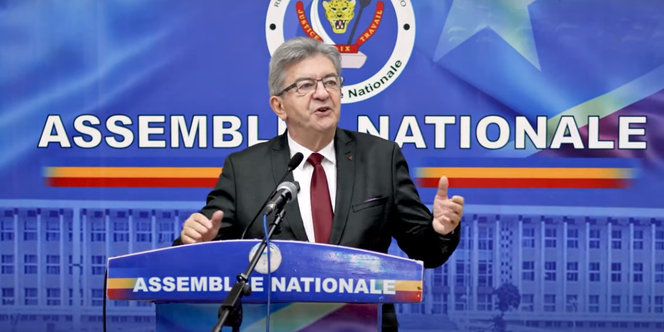


Six thousand km from Paris, far removed from the debates that are tearing the French left apart, Jean-Luc Mélenchon began a six-day tour of the Democratic Republic of Congo (DRC) on Tuesday, October 24. This visit – his second to the African continent in less than a month, after going to Morocco – was dedicated to supporting the Congolese authorities in the face of Rwanda's "expansionist aims."
"Europeans, who are often used to giving advice to others, must show humility before a world so new in dynamism, while we, the old Europe, are a little slower to understand," the founder of the La France Insoumise (LFI) left-wing party said on his arrival in Kinshasa. He was not to deliver advice, then, but a few certainties, which Mélenchon repeated against the white and pink marble backdrop of the Congolese National Assembly's banquet hall.
He spoke there late on Thursday afternoon to a hand-picked audience of twenty or so MPs, including members of the Assemvly's bureau and chairmen of parliamentary committees. "Africa doesn't fall within the future of humanity, it is the future, you are the future," he proclaimed, emphasizing the youth of the continent's population and its strength of numbers.
Emmanuel Macron was never criticized by name, as is customary for a French political figure abroad, but it was to him that Mélenchon referred when he repeated that he did not intend to "give advice." During a visit to Kinshasa on March 4, as part of a tour of Central Africa, the French president had offended his audience on an explosive subject: Rwanda's responsibility for the ongoing crisis in the DRC's east over the past 30 years.
Although in 2022 the United Nations group of experts denounced the presence of the Rwandan army on Congolese soil, Macron suggested to President Félix Tshisekedi, who was present alongside him at a press conference, that he reconsider his position. "Since 1994 [the date of the genocide of Tutsis in Rwanda, which would later destabilize the whole DRC and the east of the country in particular], you have not been able to restore the military, security, or administrative sovereignty of your country. It's also a reality, one mustn't look outside the country for blame," he declared. While not naming Rwanda – which has once again become a French ally in the region – he also called on Kinshasa to ensure that Congolese citizens who were responsible for atrocities were brought to justice.
Nothing of the sort with Mélenchon, with violence in the DRC's east reaching a new peak in intensity in recent days. "I wanted to reaffirm our fraternity with the Congolese people, at a time when we know that they are facing a difficulty that is totally imported and for which they bear no responsibility, since they have respected all ceasefire commitments," said Mélenchon at the end of an hour-long midday meeting on Thursday with Tshisekedi.
It's a bit of an exaggeration. Shortly beforehand, the Congolese news outlet Radio Okapi had reported "heavy gunfire" around Goma, the capital of North Kivu (an eastern DRC with a history of conflict), by the Armed Forces of the DRC (FARDC) against the rebels of the March 23 Movement (M23), supported by Kigali.
Mélenchon had some success with the Congolese MPs, when he reminded them that LFI MPs have been "signatories of a motion [of resolution] before the French Parliament which condemns the intrusions and abuses committed by Rwanda on the territory of the DRC" since July. The left-wing leader denounced "the resumption of military activities of aggression at a time when the DRC is organizing its elections." Presidential, regional and legislative elections are due to be held on December 20. "I expect France's condemnation, through the resolution presented by my colleagues, to bring Rwanda to its senses. The largest French-speaking country in the world [the DRC, with a population of 100 million] aspires to peace and to organize its elections as it sees fit," he said.
According to Mélenchon, Rwanda has made clear its intention to disrupt the holding of elections in the DRC: "It's clear that this is a deliberate desire to disrupt the mechanism for the functioning of democracy, and it's just a way of prolonging a challenge to its sovereignty, because the sovereignty of a nation is expressed through elections." A development which led one European diplomat to say that "he's on the same line as the Congolese president." "It's definitely a change from Macron," said an MP who was also present at the president's last trip.
Mélenchon will have the opportunity to reiterate these remarks during his trip, which will include an exchange with students from the University of Kinshasa (UNIKIN), at whose invitation he has made this trip. He will present his latest book, Faites mieux! Vers la Révolution citoyenne ("Do better! Towards a Citizens' Revolution"). "But without interfering in Congolese politics," he asserted. Part of his delegation, including three LFI MPs – Carlos Martens Bilongo (who is originally from the DRC), Nadège Abomangoli (who is originally from the Republic of the Congo) and Arnaud Le Gall (a member of the Assemblée Nationale's Foreign Affairs Committee) – will travel to Goma.
Finally, in addition to a planned detour to the Muanda Mangroves National Park, the LFI leader will speak at the brand-new Patrice Emery Lumumba Memorial in Kinshasa, dedicated to the former prime minister, independence hero and decolonization movement martyr, who was tortured and murdered in January 1961.
Translation of an original article published in French on lemonde.fr; the publisher may only be liable for the French version.
